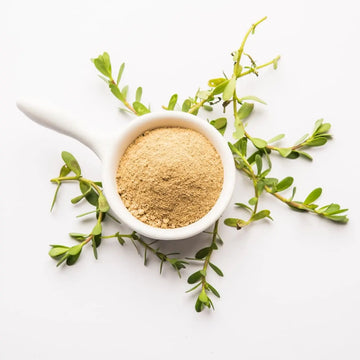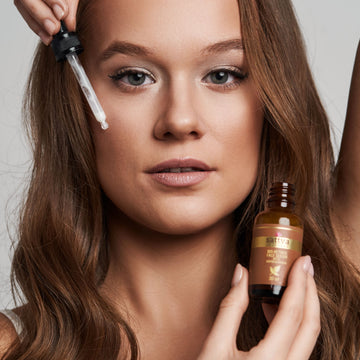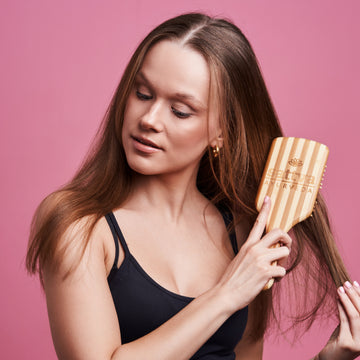Bio-retinol: a natural ingredient revolutionizing skin care
Bio-retinol: a natural ingredient revolutionizing skin care
Contents
- What is bio-retinol and why is it gaining popularity?
- Bio-retinol: a plant-based alternative to traditional retinol
- Key Differences Between Bio-Retinol and Retinol
- Why is bio-retinol called botanical retinol?
- The use of bio-retinol in skin care products
- Bio-Retinol Serum with Ashwagandha: How Does It Work and Who Is It For?
- Pro-age Day Cream with Bakuchiol - The Power of Plant-Based Retinol in Skin Care
- Bakuchiol - a key ingredient in bio-retinol
- Bakuchiol: a plant-based retinol with powerful anti-wrinkle properties
- How does bakuchiol affect the visibility of wrinkles?
- Summary
What is bio-retinol and why is it gaining popularity?
Bio-retinol is a plant-based alternative to traditional retinol that is gaining popularity in the cosmetics world. Its growing popularity is due to the fact that it is a natural ingredient that offers many benefits for the skin, such as wrinkle reduction, improved elasticity and hydration, without the negative side effects associated with the use of synthetic retinol.
Bio-retinol: a plant-based alternative to traditional retinol
Plant retinol , or bio-retinol, is a plant-based ingredient that works similarly to traditional retinol, but does not cause irritation and allergies that often occur when using synthetic forms of retinol. Bio-retinol is gentler on the skin, while effectively supporting the processes of skin regeneration, rejuvenation and hydration.
Key Differences Between Bio-Retinol and Retinol
Although bio-retinol and retinol have similar effects, there are some key differences between them. First, the power of retinol can be described as more intense, which can lead to irritation and allergies in people with sensitive skin. Bio-retinol, on the other hand, is milder, so it can be used by most people, regardless of skin type. Secondly, bio-retinol comes from plants, which makes it a more environmentally friendly and vegan ingredient.
Why is bio-retinol called botanical retinol?
Bio-retinol is often called botanical retinol because it comes from plants such as bakuchiol, which is extracted from the seeds of the Psoralea corylifolia plant. Another type of bio-retinol is that from a plant with the Latin name Bidens Pilosa. As a result, bio-retinol is increasingly chosen as an ingredient in skin care cosmetics, especially for people with sensitive skin and who care about an ecological lifestyle.
The use of bio-retinol in skin care products
Bio-Retinol Serum with Ashwagandha: how does it work and who is it for?
Bio-Retinol Serum with Ashwagandha by Sattva is a product that combines the benefits of bio-retinol with other active ingredients, such as the adaptogen Ashwagandha (yes! It is also used in cosmetics), olive oil, cottonseed oil or murumuru butter. Here, plant retinol from Bidens Pilosa was used. The serum works on the skin by stimulating regeneration processes, reducing wrinkles, improving elasticity and hydration. Bio-retinol serum with ashwagandha is especially recommended for people with sensitive skin who do not tolerate traditional retinol, as well as for those who are looking for natural and ecological solutions in skin care.

Pro-age day cream with bakuchiol - the power of plant-based retinol in skin care
Sattva pro-age day cream is another product that uses the power of plant-based retinol in skin care. It contains bakuchiol, which is a natural equivalent of retinol, and at the same time does not cause irritations or allergies. It is a product recommended for people with different skin types, including those with sensitive skin.

Bakuchiol - a key ingredient in bio-retinol
Bakuchiol is a natural compound that plays a key role in bio-retinol. It is a plant-based equivalent of retinol that offers many benefits for the skin, such as wrinkle reduction, improved elasticity and hydration.
Bakuchiol: a plant-based retinol with powerful anti-wrinkle properties
Bakuchiol plant retinol is a natural ingredient that has many anti-aging properties. It works on the skin by stimulating the production of collagen and elastin, which leads to wrinkle reduction and improved skin elasticity. Compared to traditional retinol, anti-wrinkle cream with bakuchiol is less irritating to the skin, making it ideal for those with sensitive skin. Additionally, bakuchiol is a plant-based ingredient, making it more environmentally friendly than synthetic retinoids.
How does bakuchiol affect the visibility of wrinkles?
Bakuchiol has significant impact on visibility of wrinkles thanks to its properties that stimulate the production of collagen and elastin. As a result, the skin becomes firmer, more elastic and smooth, which leads to the reduction of wrinkles and delaying the skin ageing processes. In addition, bakuchiol has anti-inflammatory and antioxidant effects, which helps protect the skin from the harmful effects of free radicals and external factors such as UV radiation or air pollution.
Summary
Bio-retinol as a natural alternative to traditional retinol, which is gaining increasing popularity in the world of skin care.



